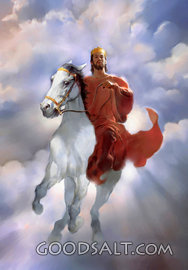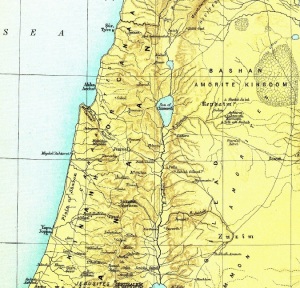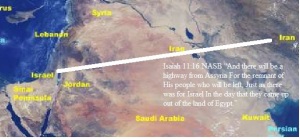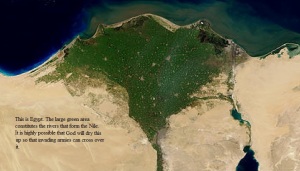A short trek through Isaiah - Chapter 11
This is not very interactive, as I am doing this out of my own personal interest. Having been challenged recently about what many assume is the probability that Isaiah was quoting a mythological saying of his time, as though it was scripture, I decided I needed a deeper understanding of Isaiah. For me, there is only one way to do that, and that is to dig.
If you don't mind digging you are welcome to join me on the journey.
Isaiah 11:1-3 NASB “Then a shoot will spring from the stem of Jesse, And a branch from his roots will bear fruit. The Spirit of the LORD will rest on Him, The spirit of wisdom and understanding, The spirit of counsel and strength, The spirit of knowledge and the fear of the LORD. And He will delight in the fear of the LORD, And He will not judge by what His eyes see, Nor make a decision by what His ears hear;”
- Of whom is the writer speaking?
- Jesus Christ, the Messiah.
Note the descriptives: “The Spirit of the LORD will rest on Him, The spirit of wisdom and understanding, The spirit of counsel and strength, The spirit of knowledge and the fear of the LORD.”
You should understand that the word fear, used in instances like this passage, mean a deep and healthy respect and reverence.
Reverence: In the Old Testament, occurs as the translation of two Hebrew words, yārē' and shāḥāh. The root idea of the former is “fear.” It is used to express the attitude toward God Himself, as in Psa_89:7 the King James Version; or toward His sanctuary, as in Lev_19:30; Lev_26:2. So the group of ideas there would be “fear,” “awe,” “reverence.” The root idea of the second is “falling down,” as prostration of the body. It is used to express the bearing toward another who is considered superior.
- “And He will not judge by what His eyes see, Nor make a decision by what His ears hear.”
I am involved with several churches, most of which deem themselves to be open-minded, non-denominational. And yet, from old to young they spew judgment out of their mouths. Don't get me wrong, I am adept at judgmentalism and fight against it always. Why? Because I, like everyone else, have sat under false teaching while refusing to open my Bible and find out what the truth is for myself.
Often, as some Bible study leader is trying to explain some horrid statement they made, will speak of God and His Great White Throne judgment, as a point of no return, where all brought before him are sent to the eternal torment of hell. Does that sound anywhere close to this descriptive we see of God? [Yes, I know, we are talking about Jesus here aren't we. However, I integrated a visual taken from the Revelation of Jesus. And yet, when you read Revelation 20 we presume this to be God sitting in judgment here. Why do we do that; because we take someone's word for it and do not educate ourselves.
Where else do we find this concept?
1Samuel 16:7 NASB “But the LORD said to Samuel, "Do not look at his appearance or at the height of his stature, because I have rejected him; for God sees not as man sees, for man looks at the outward appearance, but the LORD looks at the heart."”
Isaiah 11:4,5 NASB “But with righteousness He will judge the poor, And decide with fairness for the afflicted of the earth; And He will strike the earth with the rod of His mouth, And with the breath of His lips He will slay the wicked. Also, righteousness will be the belt about His loins, And faithfulness the belt about His waist.”
Alright, since you understand that the Lord looks at the heart, then this should demonstrate the mercy that far too many do not understand. That is that God, having looked upon the hearts of people, will be able to make a sound decision and grant multitudes entrance into the kingdom of heaven, solely based upon their good deeds.
I am not making this stuff up, for you see it in both Revelation 20 and Matthew 25. This mercy, found in both books, is more descriptive in Matthew's gospel because the focus is on the sheep, not the goats. In Revelation 20 it says little about those whose name is found in the Book of Life because that is not the focus there. That lack of description does not mean they don't exist, and it would be improper to say otherwise. I am telling you this because I have heard it taught that Revelation 20 is exclusively a judgment where everyone gets sent to the lake of fire and that is not the case.
Isaiah 11:6-9 NASB “And the wolf will dwell with the lamb, And the leopard will lie down with the young goat, And the calf and the young lion and the fatling together; And a little boy will lead them. Also, the cow and the bear will graze, Their young will lie down together, And the lion will eat straw like the ox. The nursing child will play by the hole of the cobra, And the weaned child will put his hand on the viper's den. They will not hurt or destroy in all My holy mountain, For the earth will be full of the knowledge of the LORD As the waters cover the sea”; this is definitely what the Jewish mind sees when they speak of the eternal kingdom.
- “For the earth will be full of the knowledge of the LORD As the waters cover the sea.”
A rather dramatic assertion that only God could fulfill.
Allow me to ask you a question. Why would this be a concern in the eternal kingdom?
I can't imagine it would be, but I can see a reason for an emphasis like this during the millennial reign because the nations continue to exist and continue to have a freewill choice. Forced to come to the New Jerusalem each year, they must participate in the Feast of Tabernacles. Failure to do this has some dire consequences, but this is not the final judgment, that does not happen until the Great White Throne.
Jeremiah 31:34 NASB "They will not teach again, each man his neighbor and each man his brother, saying, 'Know the LORD,' for they will all know Me, from the least of them to the greatest of them," declares the LORD, "for I will forgive their iniquity, and their sin I will remember no more."
Isaiah 11:10,11 NASB “Then in that day The nations will resort to the root of Jesse, Who will stand as a signal for the peoples; And His resting place will be glorious. (11) Then it will happen on that day that the Lord Will again recover the second time with His hand The remnant of His people, who will remain, From Assyria, Egypt, Pathros, Cush, Elam, Shinar, Hamath, And from the islands of the sea.
In that day, or, on that day, what does this all point toward?
The phrase has multiple meanings, some of which are particular moments, while others cover a broad spectrum such as the “seven-year” period and the millennial reign of Christ.
- “ The nations will resort to the root of Jesse.”
Romans 15:12 NASB “Again Isaiah says, "THERE SHALL COME THE ROOT OF JESSE, AND HE WHO ARISES TO RULE OVER THE GENTILES, IN HIM SHALL THE GENTILES HOPE."”
Isaiah 11:1-5. - We have already discussed these passages, and it is clear that it is speaking of the Messiah, Jesus Christ. But this speaks of a branch from the root of Jesse. When I worked with plant propagation, we learned that it was common for growers to take a rootstock that resists disease and nematode invasions common to many soils. The variant was then grafted onto the root stock. Most roses that we buy have already had that done, and we don't even pay attention to it, nor do we care.
Ruth 4:17 NASB “The neighbor women gave him a name, saying, "A son has been born to Naomi!" So they named him Obed. He is the father of Jesse, the father of David.”
Obviously, he is talking about a lineage; an ancestry, specifically initiating with Jesse, the father of David. I think it is safe to say that Jesse was a righteous man, but what did Jesse do? He fathered David, who later became the king and a man after God's own heart.
Isaiah 11:12,13 NASB “And He will lift up a standard for the nations And assemble the banished ones of Israel, And will gather the dispersed of Judah From the four corners of the earth. (13) Then the jealousy of Ephraim will depart, And those who harass Judah will be cut off; Ephraim will not be jealous of Judah, And Judah will not harass Ephraim.
- “And He will lift up a standard for the nations.”
He is the Messiah.
Since an aspect of our discussion is “the day of the Lord” let's talk about that for a moment.
If you do a search for the phrase, “in that day”, the NASB produces 89 verses; most of which speak about God's anger, hiding his face, and a time of judgment. This information should prompt you to ask when this time will be. We, in Christianity, love to call this time the tribulation. I have a problem with that since Jesus told us that tribulations would be a way of life. The time that is coming is called a time of judgment and wrath, and you can find that throughout scripture, especially in the Revelation.
Isaiah 10:20 Now in that day the remnant of Israel, and those of the house of Jacob who have escaped, will never again rely on the one who struck them, but will truly rely on the LORD, the Holy One of Israel.
Isaiah 17:7 In that day man will have regard for his Maker, And his eyes will look to the Holy One of Israel.
Isaiah 19:21 Thus the LORD will make Himself known to Egypt, and the Egyptians will know the LORD in that day. They will even worship with sacrifice and offering, and will make a vow to the LORD and perform it.
Zechariah 2:11 "Many nations will join themselves to the LORD in that day and will become My people. Then I will dwell in your midst, and you will know that the LORD of hosts has sent Me to you.
I hope you get a general idea, for this aspect has never been clear to me. If others attempted to teach on it in my youth, I do not remember, or it made no sense. Since I am a visual learner, and I have not been able to visualize this scene in my mind, I am still not sure I am getting it.
- “Then the jealousy of Ephraim will depart, And those who harass Judah will be cut off; Ephraim will not be jealous of Judah, And Judah will not harass Ephraim.”
From MacArthur: "Ephraim … Judah. These were the two major divisions of Israel after the schism under Jeroboam (1Ki_12:16-20). Ephraim was the name representing the ten northern tribes, and Judah the two southern tribes. When the Messiah returns, they will reunite in a lasting peace."
1 Kings 12:19 NASB So Israel has been in rebellion against the house of David (Judah) to this day. (Emphasis, mine.)
- “those who harass Judah will be cut off.”
- Will this be in one fell swoop, or progressively?Since we see no relief for Israel, it might be best to see this as one massive military action, although I am not sure God calls it an operation. We see this in Revelation 19:11-21.Revelation 19:11-21 NASB 11) And I saw heaven opened, and behold, a white horse, and He who sat on it is called Faithful and True, and in righteousness He judges and wages war. 12) His eyes are a flame of fire, and on His head are many diadems; and He has a name written on Him which no one knows except Himself. 13) He is clothed with a robe dipped in blood, and His name is called The Word of God. 14) And the armies which are in heaven, clothed in fine linen, white and clean, were following Him on white horses. 15) From His mouth comes a sharp sword, so that with it He may strike down the nations, and He will rule them with a rod of iron; and He treads the winepress of the fierce wrath of God, the Almighty. 16) And on His robe and on His thigh He has a name written, "KING

- When Jesus comes in his glory
OF KINGS, AND LORD OF LORDS." 17) Then I saw an angel standing in the sun, and he cried out with a loud voice, saying to all the birds which fly in mid-heaven, "Come, assemble for the great supper of God, 18) so that you may eat the flesh of kings and the flesh of commanders and the flesh of mighty men and the flesh of horses and of those who sit on them and the flesh of all men, both free men and slaves, and small and great." 19) And I saw the beast and the kings of the earth and their armies assembled to make war against Him who sat on the horse and against His army. 20) And the beast was seized, and with him the false prophet who performed the signs in his presence, by which he deceived those who had received the mark of the beast and those who worshiped his image; these two were thrown alive into the lake of fire which burns with brimstone. 21) And the rest were killed with the sword which came from the mouth of Him who sat on the horse, and all the birds were filled with their flesh. - This battle will be quick, decisive, and only against those who choose to fight against God. Since God sees those that fight against Israel as fighting Him, then I am certain they will be included.
- One other thing, it will be global. But, you have to keep in mind what has going on in the world before this happens.
- Hail, fire, stars falling from the sky, and earthquakes that are off the scales. It is entirely possible that the land masses may be reconnected at this point, making the definition of global to mean a much smaller world.
Isaiah 11:14 NASB “They will swoop down on the slopes of the Philistines on the west; Together they will plunder the sons of the east; They will possess Edom and Moab, And the sons of Ammon will be subject to them.”
- “They will swoop down on the slopes of the Philistines on the west;”
- My first question is, who is being referred to when it says “they”?

- Philistia along the South Western coastal border, we understand as Gaza.
Because the present subject is Ephraim, who has set aside, it's hostility to Judah, the Southern states (I suppose that is one way to look at it.) Then I think it is safe to assume Ephraim – Note: the world does see any distinction here, as any action is identified as Israel. This assumption can create problems as two-thirds of Israel, the nation, will be slaughtered during the time of wrath, while it seems the other third flees. I do not see anyone left to defend a populace. But, then I am not God, and God does not live inside my subjective box. Therefore this could happen as you read this. Currently, it seems that Gaza is allowed to live within their limitations until missiles start raining down on Israel once again, and then the active military efforts deluge them.
These efforts, however, only seem to be temporary fixes to the problem.
Isaiah 11:15 NASB “And the LORD will utterly destroy The tongue of the Sea of Egypt, And He will wave His hand over the River With His scorching wind, And He will strike it into seven streams And make men walk over dry-shod.”

- A highway from Assyria
The IVPBBC states: “gulf of the Egyptian Sea. This is the only occurrence in the Bible of a body of water called the Egyptian Sea and is therefore difficult to place with any certainty. Most commentators identify it with the Gulf of Suez.
- “And He will wave His hand over the River With His scorching wind, And He will strike it into seven streams And make men walk over dry-shod.”
Isaiah 11:16 NASB “And there will be a highway from Assyria For the remnant of His people who will be left, Just as there was for Israel In the day that they came up out of the land of Egypt.”
Was there a highway, as we understand it, coming out of Egypt? Nope, but God did cut a path through the Red Sea, expansive enough to march over a million people across on dry land. That means that it was broad and entirely dry when they crossed. The Egyptians, when they assayed to cross were drowned in that same sea. So, in a sense, this was the highway. We might assume that this will happen again because the precedent has been set.

- Egypt and the Nile


